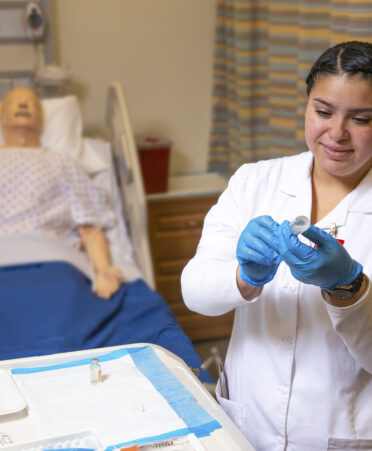(HARLINGEN, Texas) – Texas State Technical College’s nursing students continue to work using the values that Florence Nightingale established as early as the 1850s.
But as nursing students graduate and move into jobs at hospitals and other medical care facilities, they are finding an increasing shortage of needed personnel.
The Texas Department of Health and Human Services’ Texas Center for Nursing Workforce Studies has projected that in 2032 there will be more than 79,000 licensed vocational nurses in Texas but a demand for more than 91,000. The state agency also projected that in 2032 there will be more than 291,000 registered nurses in the state but a need for more than 348,000.
“The hospitals that pay less have the bigger need,” said Patricia Palomo, director of nursing education at Valley Baptist Medical Center in Harlingen and a member of the TSTC Nursing program’s advisory board.. “Staff go where the money is.”
Adrienne Reyes, director of TSTC’s Registered Nursing program, said the Texas Board of Nursing requires all state nursing schools to have a 10-1 student-to-instructor ratio. As nursing programs request permission to enroll more students, Reyes said the board looks at pass and graduation rates and how many graduates are going into the workforce.
“The biggest part of the restriction is finding nursing educators,” Reyes said. “Our educators need to be master’s degree-prepared nurses.”
TSTC offers a certificate of completion in Vocational Nursing at the Breckenridge, Harlingen and Sweetwater campuses. TSTC offers an Associate of Applied Science degree in Nursing at the Harlingen and Sweetwater campuses. The associate degree program is for those who are already licensed vocational nurses to transition to becoming registered nurses.
“The advantage of a transition program like ours is the student that has the licensed vocational nursing license can be working in the workforce. They can be getting a salary, supporting their family and getting hands-on experience while they are going through the program,” Reyes said.
She said the registered nursing program has a 96% placement rate for graduates. She said the other 4% of graduates go on to pursue a bachelor’s degree in nursing and may not immediately enter the workforce.
According to Reyes, a majority of graduates stay close to home to work. She said the Texas Rio Grande Valley has a large need for nurses of all levels.
“They want to stay here,” she said. “This is where they were brought up, and they want to continue to serve the population they know so well.”
Reyes said Harlingen’s two hospitals, Harlingen Medical Center and Valley Baptist Medical Center, offer scholarships that help TSTC nursing students pay for their state board exams and license registration fees. She described this as an investment in the students in hopes that they will make the best decision as to where they want to go to work.
Leashia Ruelas, a nursing supervisor at Rolling Plains Memorial Hospital in Sweetwater and a member of the TSTC Nursing program’s advisory board, said getting people interested in the nursing field should begin as early as high school.
“(I think it should go) back to candy stripers, but something that gets the younger person wanting to go to the hospital,” Ruelas said. “Look at the things high school students can do to have a career right out of high school.”
Reyes said students who go straight into a four-year registered nursing program tend to focus more on community nursing and leadership.
“By transitioning to a registered nurse, they (licensed vocational nurses) are more valuable because they have more skills under their belt,” she said.
Reyes said the statewide Nursing program is focusing on student recruitment in the next year. She said during the COVID-19 period, a lot of nurses traveled for work because they could make a lot of money, but now there are many nurses reaching retirement age and leaving the profession.
For more information on TSTC, go to tstc.edu.
